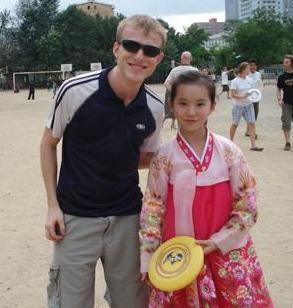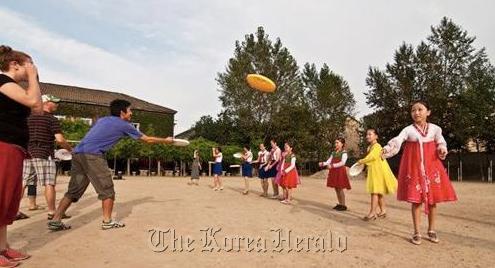While London hosts the Olympics this summer, a different competition will get underway on the other side of the globe. But this series has no flaming torches, gold medals or even referees. The game is Ultimate Frisbee, and the venue is the North Korean capital Pyongyang.
The “Peace Tournament” is set for Aug. 11 and is sponsored by Beijing-based Koryo Tours. The rules of Ultimate, as the sport is known for short, are a mix-match of basketball and American style football, in which one team attempts to huck, or throw, a plastic disc to a receiver in the other team’s end zone.
Pyongyang is perhaps better known for its gymnastics spectacular, the Arirang Mass Games, in which tens of thousands of performers pay tribute to the nation’s leaders. But this is not Ultimate’s first appearance in the reclusive nation.
The unique locale is what got long time Ultimate enthusiast Eric Fish involved in the first Pyongyang tournament last year.
The “Peace Tournament” is set for Aug. 11 and is sponsored by Beijing-based Koryo Tours. The rules of Ultimate, as the sport is known for short, are a mix-match of basketball and American style football, in which one team attempts to huck, or throw, a plastic disc to a receiver in the other team’s end zone.
Pyongyang is perhaps better known for its gymnastics spectacular, the Arirang Mass Games, in which tens of thousands of performers pay tribute to the nation’s leaders. But this is not Ultimate’s first appearance in the reclusive nation.
The unique locale is what got long time Ultimate enthusiast Eric Fish involved in the first Pyongyang tournament last year.

“I couldn’t pass it up,” said Fish, 27, a native of Missouri who studies journalism in Beijing and claims to have a “morbid fascination” in socialist and communist states. “There is a tendency for bad news (about North Korea), because that’s what the media covers. I assumed there was more nuance to it.”
Fish was not disappointed. He was joined by about 60 other players, comprised of Western tourists, members of Pyongyang’s expat community and around 15 North Koreans that work for a state-run tourism agency.
“I was amazed. They had never played frisbee before,” he said. “They picked it up pretty quick.”
North Koreans were enthusiastic, Fish says, recalling one young woman kicking off her high heels to get in on the game played in a park near Pyongyang’s Mount Taesong South Gate. There were dramatic diving catches and plenty of high-fives amongst the participants, who were subbed in and out on mixed nationality teams. But the disc had to be grounded once in what can only be described as an only in North Korea moment.
“In the middle of the game, this guy walks through herding about 3-dozen deer. Nobody could quite figure out what was going on with that,” Fish said.

Not long ago, sports tourism in North Korea was unthinkable, but that has all changed thanks largely to Koryo Tours. The company has pioneered adventure travel into the North and offers packages, including football (soccer), cycling and cricket.
But some say that Ultimate is an especially fitting kind of sports exchange between nations with a lack of trust.
“There’s a code of conduct, called the Spirit of the Game, which is basically be honest and play the right way. That’s a part of the culture of Ultimate, and I think spreading that is not a bad thing in any way,” says Andray Abrahamian, who helped develop the Pyongyang tournament with Koryo Tours.
Abrahamian, 35, originally from the U.K., says what stood out the most for him during last year’s trip was when the players visited a North Korean middle school and played frisbee with school children. For Ultimate fanatics like himself, “the idea of introducing a sport that they are obsessed with to a country that has never seen it” was a more important reason to join the tour than the tournament itself, he said.
Abrahamian is also the executive director of the Choson Exchange, an NGO that supports economic development in North Korea.
He says due to the North’s opaque system, doing work there, whether organizing a sports match or holding workshops on financial management with government officials, remains a challenge.
“It’s hard to know where the buck stops,” he says. But he hopes that by holding more sports programs like the Ultimate tournament, in which North Koreans and Americans play as teammates, a cultural and political divide can be overcome.
“This is just one tiny contribution to the normalizing of interactions between North Koreans and foreigners,”Abrahamian said.
Another challenge that the Choson Exchange, Koryo Tours or any other entity that does business with North Korea faces is overcoming criticism that they are merely lining the pockets of a dictatorship with one of the worst human rights records in the world and that frequently threatens to attack its neighbors with nuclear weapons. Some observers say exchanges like the Ultimate tournament creates false expectations.
“Such activities have conditioned us to be optimistic and give to North Korea while North Korea has taken advantage of the outside world’s cash,” says Lee Sung-yoon, who lectures in Korean Studies at Tufts University’s Fletcher School of Law and Diplomacy.
Lee says he does not oppose these kinds of visits in general, but “it’s a bit unrealistic to believe that it will lead to some sort of diplomatic breakthrough.”
Even with a new leader at the helm, Lee does not expect that the North Korean government will deviate much in its stance toward the outside world. There had been some hope that new leader, Kim Jong-un, the son of the late ruler Kim Jong-il, would adopt a more flexible approach to foreign relations due in part to his experience studying overseas as a teenager.
John Delury, a professor of East Asian Studies at Yonsei University, says concern that the North Koreans are extracting money from tourism ventures as a means to fund its nuclear weapons program or other military endeavors is itself exaggerated.
“It’s a kind of hypersensitivity, almost a paranoia,” Delury, who advises the Choson Exchange, said. “At the maximum, how much could it skim off of a frisbee tournament? I think we are talking about peanuts.” Looking at sports or other cultural exchanges from a costs-benefits perspective, the relatively small amount of money put into arranging these trips outweighs any negative effects and does help in building trust amongst supposed enemies, he said.
“It’s really a waste for the West, for South Korea, for neighboring countries concerned with North Korea not to make use of this tool,” he said.
As for Eric Fish, who played in last year’s Pyongyang Ultimate tournament, he says while he can’t be sure how much change his trip made at the government level, he is confident that at least for the North Koreans he played alongside with, their opinions about Americans or Westerners did improve.
“Once you are playing, you forget who is from where,” he said.
Any sense of national allegiance or rivalry was lost during a brief moment of celebration with a North Korean teammate; an instance that still seems surreal to him.
“She ran over, gave me a big, old hug,” Fish said. “Getting a hug from a North Korean woman who just scored a point in Ultimate Frisbee. Everything about that situation makes no sense at all.” (Yonhap News)
-
Articles by Korea Herald




















